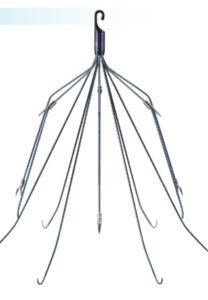The lawsuit was filed by Kris A., a woman who was implanted with the C.R. Bard Meridian® Vena Cava Filter on April 18, 2012 at a hospital in Wisconsin.
Meridian is a medical device that is designed to catch blood clots and prevent pulmonary embolisms. It is implanted in the inferior vena cava (IVC), a major blood vessel that carries blood to the lungs.

C.R. Bard Meridian® IVC Filter
C.R. Bard no longer sells the Meridian. It was approved in 2011 with a 510(k) application, which means the FDA did not require clinical trials to establish its safety because it was “equivalent” to other IVC filters.
Those “equivalent” filters had nearly-identical designs — and flaws. Meridian is closely related to the Recovery and G2 filters, which were also sold for only a few years and pulled off the market without recalls.
Recent studies estimate that around 40% of Recovery and G2 filters fracture within 5 years. In many cases, broken parts of the filter travel in the bloodstream until they get stuck in the heart, lungs, or arteries.
Meridian is designed with 12 needle-like wire legs arranged in a cone-shape, with a retrieval-hook on one end. Because the risk of fracture increases the longer it remains implanted, the FDA recommends removing temporary filters as soon as possible — 29-54 days, ideally.
Lawyers accuse C.R. Bard of selling a defective and dangerous medical device, failing to warn about complications, and not studying it adequately for safety before marketing it as “safe and effective.”
The lawsuit was filed on December 29, 2016 in the U.S. District Court for the District of Arizona — Case No. 2:16-cv-04573.
It will be centralized with over 1,280 other IVC filter lawsuits now pending against C.R. Bard in Multi-District Litigation (MDL No. 2641) — In Re: Bard IVC Filters Products Liability Litigation.
The plaintiff is represented by Ben C. Martin of The Law Offices of Ben C. Martin in Dallas, Texas. He serves on the plaintiffs’ steering committee of the Bard IVC Filter MDL.
 Editor’s note: For more information about IVC Filter lawsuits and your legal rights, please contact The Law Offices of Ben C. Martin.
Editor’s note: For more information about IVC Filter lawsuits and your legal rights, please contact The Law Offices of Ben C. Martin.
